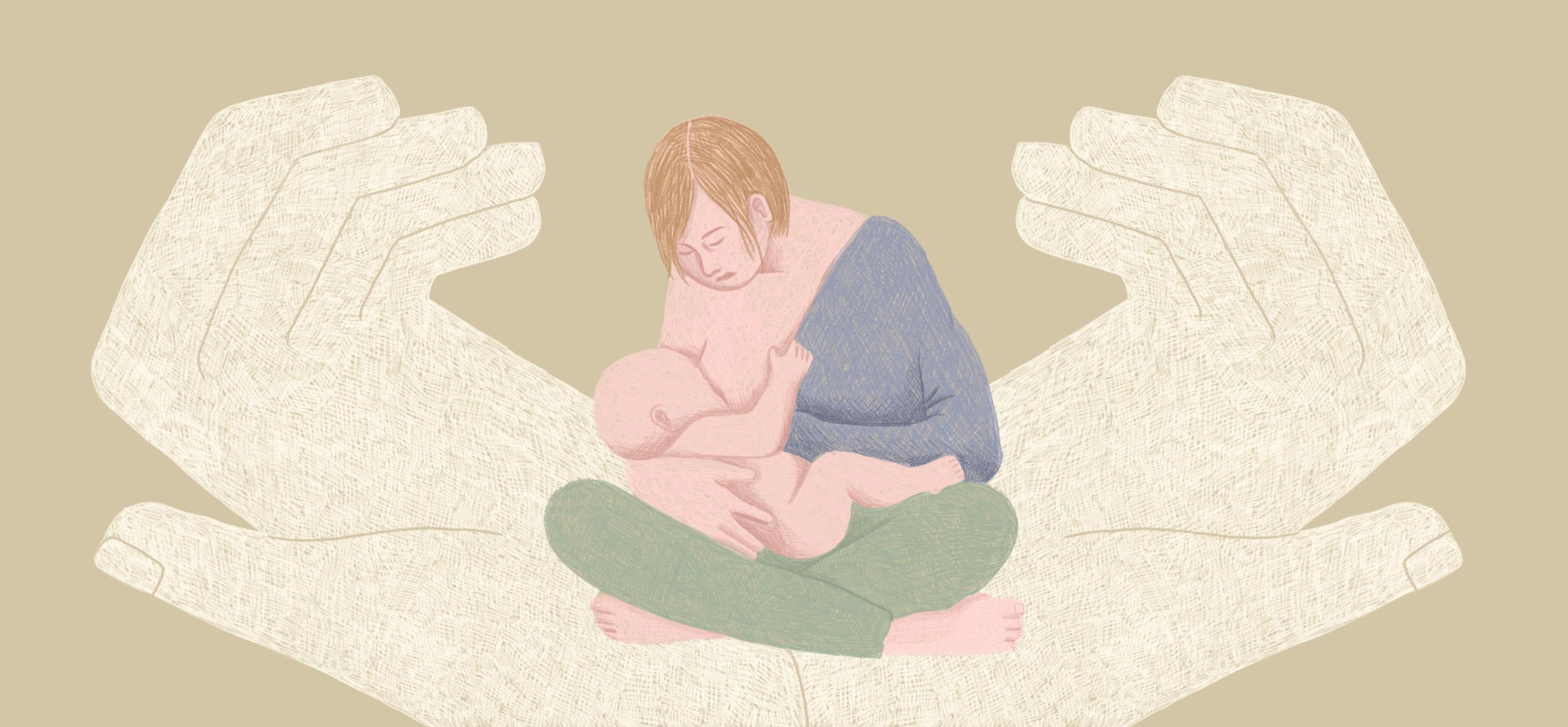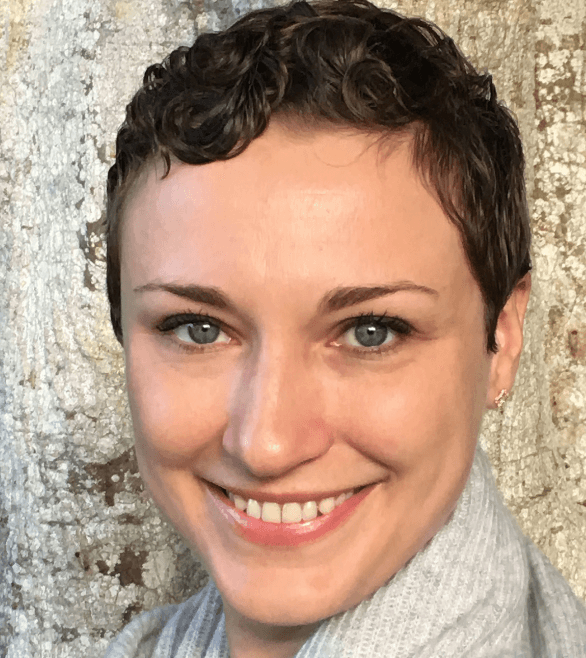
Postpartum
Help Wanted
I hired a baby nurse to help care for my newborn—it turned out I was the one she nurtured the most.
- Written By
- Kristin Vuković
- Illustration
- Rachel Levit
“Why is she here?” I groggily asked the hospital attendant wheeling my newborn daughter in from the nursery.
“It’s been a long time since you’ve seen her,” she said.
Anxiety crept up my spine. Even in those early post-birth hours, I feared the looming shadow of depression. As someone with a long history of depression dating back to middle school, I knew I was at risk of it returning, postpartum. I recognized the symptoms as they came: massive mood swings, excessive crying, rampant anxiety. It was all too familiar, and it frightened me. I worried my darkness would rub off on this innocent baby.
After an unplanned C-section, I was depleted, confined to a hospital bed with a catheter and compression booties. I couldn’t take care of myself, let alone a baby. I lamented what I saw as my failure of not having a “natural” birth. That’s the depression talking, I could almost hear my mother—a former psychiatric nurse—say. But she wasn’t there. Connie was.
Connie was a baby nurse I’d met once, briefly, at a friend’s apartment, when my husband and I visited her newborn. “Connie took care of me as much as the baby,” my friend said, describing how Connie boiled cabbage leaves to place on her swollen legs and made her healing teas from scratch, with herbs she’d carried from India. My husband, a Sikh who’d grown up in India, thought the idea of hiring someone like Connie, post-birth, made perfect sense. He’d had an “ayah,” sort of a cross between a nursemaid and a nanny, as a child and so had most of his friends. He was used to having non-family members around, intimately participating in his day-to-day life.
As a Minnesotan growing up in a middle-class family, I had the occasional after-school babysitter, but my mother was a hands-on stay-at-home mom who quit her job when I was born to take care of me. Raised “Minnesota nice,” I was accustomed to hiding my pain from others, those closest to me and, especially, strangers. Used to sublimating my emotions, I took pride in my self-sufficiency and independence.
The idea of having a stranger come to live with us during one of the most vulnerable times in my life was both unnerving and comforting.
I was terrified of having a baby, and since I wouldn’t have hands-on family help and didn’t know how my depression would fare postpartum, I agreed we should book Connie for a couple months after I gave birth, until she needed to fly back to India to prepare for her daughter’s wedding.
In Mount Sinai Hospital after my C-section, Connie sat on a chair near the window in the tiny room, staring at me, her long black hair streaked with silver and pulled into a loose braid slung over her shoulder. I rolled on my side, mindful to protect what felt like a still-pregnant stomach, held together by stitches and tape. As a cool air-conditioned draft pricked my skin, I realized the back of my gown was wide open, and Connie could see my exposed backside. To my surprise, I didn’t care. Given Connie’s line of work, I assumed she’d seen everything. But, also, I was so tired; it might have been the first time in my life I didn’t care what anyone thought of me.
After I was discharged, I barely made it up the 47 steps to our fourth-floor New York City apartment. Connie carried our newborn while I leaned on my husband and the railing, pausing to recover on each landing on a folding stool. If walking upstairs seemed insurmountable, I knew our daughter was, at least for now, in better hands than mine.
A calming presence in our apartment, Connie shared the second bedroom with our daughter and put her to sleep on her lap in the rocking chair, our baby’s tiny body suspended stomach-down over her knees—a position she told us would help reduce gas. She brought the baby to me when it was time to breastfeed, and helped me adjust to her in my perpetual hypnagogic state. In those early days, life was a blur. I only wanted to sleep.
My elderly parents, who stayed in a nearby Airbnb for two weeks before and after our daughter was born, visited our apartment once a day to see their grandchild; scaling the stairs was difficult for them to do twice daily. I knew they wouldn’t be able to help us with caretaking, but I was still grateful they were there. While sitting on the couch, my parents took turns cradling her in their arms. My father was afraid his Parkinson’s would cause him to drop her. I worried I would damage our daughter in other ways—with the sadness I was sure she could sense.
I breastfed in the living room, a task I hated. A friend had gushed about how breastfeeding was a euphoric experience for her, an oxytocin burst which brought her closer to her daughter. It wasn’t like that for me; it was literally draining, and I dreaded pumping, which made me feel like a lactating cow. I had a large milk supply, for which I was supposed to be grateful, but it felt like I was always pumping my painfully engorged breasts. I recalled photos from our birthing classes of blissful new mothers breastfeeding beaming babies, intimately connecting with their offspring. Every time I would feed my daughter, I’d think, this isn’t how it was supposed to be. What made it worse was the sense that I wasn’t just having a hard time breastfeeding; I was having difficulty bonding with my daughter.
Trying to help, my husband positioned a breastfeeding pillow too tightly against my tender stitches. I yelped. He apologized. My tears flowed uncontrollably. As my parents sat on the couch, stone-faced, watching me cry, Connie watched us all.
“Go hug your daughter,” she commanded my mother.
My mother paused, bewildered, then rose to hold me awkwardly. As she hugged me, I realized I had needed my mom to acknowledge my suffering, even if she couldn’t fix it. I needed her to comfort me.
Connie saw what I couldn’t put into words. I thought a baby nurse was there to help the baby. But Connie had intuited my emotional needs and spoken for me.
Over the next two months, Connie saw me at my worst moments, when I was scared but trying. One evening, after severe mastitis, a 104-degree fever, and antibiotics which caused hives, I broke down while pumping. My hormonal-led emotions were a deluge. I felt like I was drowning. Connie prepared cold washcloth compresses and laid them on my forehead. In the throes of fever, I was delirious.
My husband was away on business in California, and in our New York City apartment, listening to life pulse outside, I felt overwhelmed and alone. I was a prisoner in our walk-up until I healed. I’d been trapped inside for what seemed like months, although it had only been weeks. My days before motherhood seemed a distant memory, my world suddenly and painfully small. Our daughter was sleeping in the next room.
The pump sucked. My crying escalated. I didn’t know how I could be there for another helpless being when I was in such pain myself. I felt inept, inadequate, worthless. My negative thoughts spiraled. I resisted reaching out to anyone. I didn’t think my childfree friends would understand, and reasoned those who had kids would think me weak since they’d been here, and done this, without falling apart. I feared everyone’s judgment, including my own. I felt entirely alone.
I didn’t hear the door open, but Connie appeared in our bedroom. She walked over to me, a huddled mess in the corner, and put her hand on my shoulder, giving me permission to be imperfect, human. She gave me more grace than I gave myself. I thanked her, but words seemed insufficient.
When it was time for Connie to leave, I wondered if I could take care of our daughter without her help. She had taught me how to rock and swaddle; how to breastfeed and burp; how to give baths; how to put a special yellow paste into my daughter’s bellybutton to calm indigestion. Connie showed me how to mother.
We hugged. I cried. I remember looking out the window, holding our two-month-old, waving goodbye as Connie stepped into a cab. I wondered what it was like floating in and out of strangers’ lives, witnessing people’s most naked moments and helping them become parents.
In other countries, maternity staff check in on new mothers to make sure they are recovering after the birth. In the U.K., at-home visits from midwives employed to support new mothers in these tender first few days of motherhood last until the baby is at least 10 days old. In the Netherlands, a kraamverzorgster (home maternity nurse) does house visits for three to eight hours a day, for eight to 10 days after the birth, longer if the mother is breastfeeding and needs more help. The nurse checks on the baby, but she’s also there to help the moms, to make sure they are getting enough rest and have enough sustenance—nurses can even shop for groceries and make sure there is clean laundry, all for around $5 an hour; the rest is covered by health insurance.
After discharge in the U.S., moms are essentially on their own. I was incredibly lucky to be able to hire Connie. But we fail moms in this country by making postpartum support a privilege, not a right. We need to find ways to support mothers who don’t have help from family or friends, and can’t afford a baby nurse. It’s a lonely time, and you can’t face it alone. Connie saw to it that I didn’t have to.
After Connie left, I knew there would be moments in motherhood where I’d succeed and fail. And moments where I’d need to ask for help.
I was able to seek help from a therapist to manage my depression, and eventually resurfaced into the world. I made new mom friends and we shared our parenthood struggles. But in the darkest moments of early motherhood, it was Connie who showed me the way. Connie’s hand on my shoulder substituted for the words I couldn’t say to myself then: You’re doing your best. You’re not alone. It’s going to be OK.
If this story strikes a chord, learn more about safeguarding your mental health postpartum and how to argue in fav or of the paid family leave we so desperately need.
Kristin Vuković

Kristin Vuković has written for The New York Times, BBC Travel, The Daily Beast, AFAR, and Public Books, among others. She holds both a BA in Literature and Writing and an MFA from Columbia University, where she was Editor-in-Chief of "Columbia: A Journal of Literature and Art"; She lives in New York with her husband and daughter.